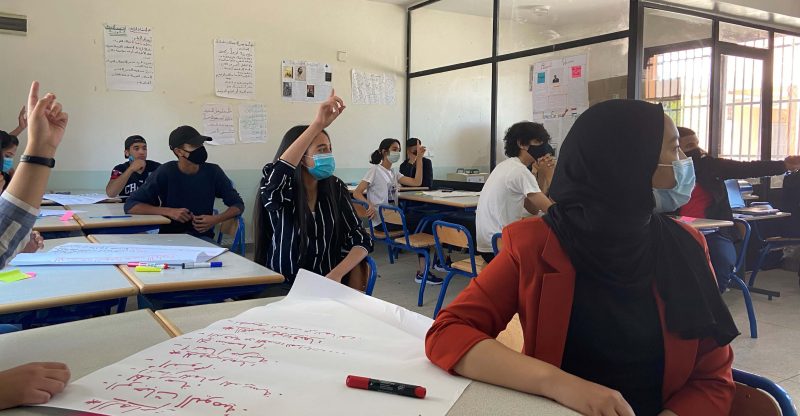
Grants like the MCC-funded Education for Employability Partnership Fund in Morocco, which encourages innovative projects focused on school life and pedagogical approaches to improve Secondary Education, play an important role in MCC’s work to reduce poverty through economic growth.
Since its inception in 2004, MCC has changed the conversation on how best to deliver smart U.S. foreign assistance by focusing on good policies, country ownership, and results. Focusing on results—a core value of MCC—ensures that the American people are getting a good return on their investment: demonstrable, measurable results that reduce poverty, promote economic growth, and strengthen institutions.
In November 2020, MCC advanced its results-oriented tradition by releasing innovative Program Grant Guidelines (PGG) for its partner countries. Drawing on best practices from across the federal government and private grant-making entities, the new PGG provide partner countries with a leading-edge, results-oriented model that aligns with MCC’s strategic priority of increasing private sector engagement. This also incorporates MCC’s own forward-thinking approaches to the design, award, and administration of grants.
How does the PGG promote Grant Making for Results?
The PGG is a policy document that sets out the principles, rules, and procedures to govern the award and administration of MCC-funded grants by partner country implementing entities, known as Millennium Challenge Accounts (MCAs). MCAs make grants under a compact to support a public purpose in furtherance of the compact. This assistance can take many forms. The range of grant programs may run from an MCA entity awarding a single grant to carry out a single program activity to a large, multi-million-dollar grant facility that awards multiple grants in order to achieve a programmatic objective. Grants are given to both private sector and non-profit entities.While all the of principles and procedures embodied in the PGG lead to efficient and effective grant making, it is worth noting certain features that specifically focus on performance to achieve results. These features are discussed below.
Milestone Disbursement Schedule
The PGG require that MCA grant agreements use a milestone-based disbursement mechanism. Basing disbursements on the achievement of milestones is a simple and effective structure for achieving results. The Milestone Disbursement Schedule is tied to defined milestones either in terms of carrying out grant activities, results achieved, or costs incurred. Milestones must be results-based and must represent a clear achievement toward the overall program goals.
Grant Selection Process
The PGG recognize that grant making is and should be vastly different from awarding contracts. MCA grants serve a dual purpose: they provide financial assistance that supports and benefits the grantee directly, and they simultaneously empower the grantee to carry out a program in support of a public purpose. As a co-stakeholder in the outcome of the grant program or activity, the grantee performs a key role in implementing an MCC compact or threshold program. Procurement, by contrast, serves a different purpose. Procurement is the purchase of specific goods, works or services for the use of the buyer.The grant award procedures defined in the PGG permit and encourage MCAs to select grants that will achieve the results best aligned with the goals and objectives of the grant program. It also gives MCAs tools to work with grant applicants to improve their grant applications and their capability to carry out the grant. Every feature of the procedures is aimed at awarding grants to stakeholders that will achieve the best results toward the core objectives of the program and ultimately reduce poverty through economic growth.
Use of Fixed Amount Grants
As noted in a recent Stanford Social Innovation Review article, fixed-amount awards are an under-utilized instrument in federal grant making. Fixed-amount grants allow for more results orientation with less direct oversight. In a fixed-amount award, periodic disbursements are made to the grantee upon achieving pre-negotiated milestones. In a fixed-amount grant, costs are determined up front and thus do not need to be verified during implementation and audits are not required. This approach stands in contrast to reimbursing costs where the funder needs to verify all costs before reimbursed and audits are required.MCC almost exclusively uses fixed-price contracts for MCA procurements and is following suit with its PGG for MCA grants. In addition, fixed-amount awards make it easier to work with the private sector as reporting requirements are minimized and payments are made upon achievement of milestones. There is no threshold limit for using fixed-amount grants.
This type of grant relationship reduces some of the administrative burden and reporting requirements for both the MCA, as grantor, and the grantee. Because the costs have been determined at grant award, accountability is based primarily on performance and results as opposed to reviews of actual costs incurred.
Private Sector Engagement
The PGG bring a new level of transparency to the grant making process. The new guidelines, with their simplified grant application process, performance-based funding mechanism, and minimized reporting requirements, all serve to make MCA-managed funding more attractive and manageable for private-sector businesses. The grant award model is also attractive since it incentivizes performance via delivery of specified results, as opposed to traditional grants that require more reporting and are based on a cost-reimbursement model.To increase private sector funding in MCC-funded grant programs, the PGG allow for cost share and leverage from the private sector. In addition, MCC has recently developed a detailed Leverage Facility Grant Manual on how to manage grant programs requiring a 1:1 private sector leverage, as well as a new Program Partnerships Pathway that requires a minimum 25 percent cost share from partners.
Looking Ahead
Future blog posts will examine how the features of the PGG advance MCC’s core value of focusing on performance that delivers sustainable results. We also hope to tell the story of how well the PGG serves the MCA Entities in the context of real grantmaking. Subsequent blogs will focus on real life applications of the PGG.

